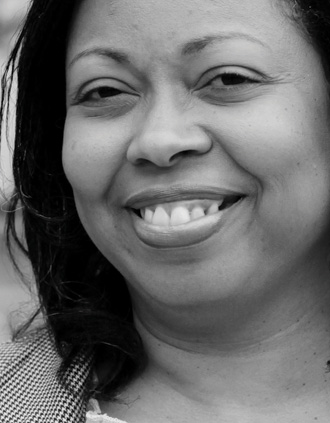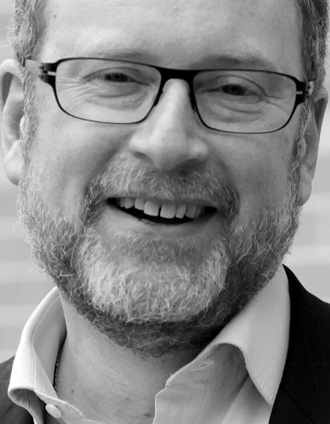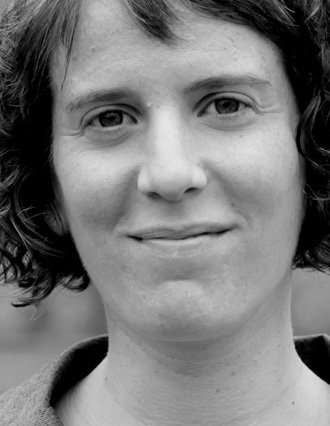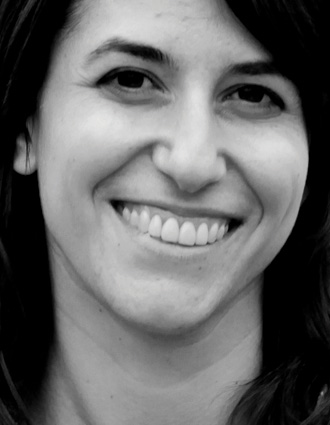Oberlin Alumni Magazine
Fall 2011
The Oberlin Alumni Magazine asked four of them how they got into the field, with this prompt:
"I wasn’t a journalism major, but..."
Oberlin alumni journalists reflect on their roundabout routes into their field.
For a school with no journalism major, Oberlin produces more than its fair share of journalists. They work in every medium and at every level of the field, ranging from senior editors at long-standing publications to bloggers at fledgling startups.
Recognizing the great wealth of talent among its alumni, the staff of the Oberlin Review — led by editor-in-chief John Light ’11 and commentary editor Monica Klein ’11 — organized a two-day symposium last April 7 and 8 featuring 16 alumni journalists who discussed the topic "Objectivity in the Age of New Media".
Objectivity in the Age of New Media Symposium alumni participants:
In addition to those whose words appear here, the symposium featured the following:
- Melissa Fay Greene ’75,
award-winning investigative journalist and author of five books, including the recent No Biking in the House Without a Helmet. - Chris Jenkins ’93,
staff writer on the local desk,
Washington Post - Kate Julian ’00, editor,
Double X and Slate - Lisa Abend ’86,
food critic and Spain correspondent, TIME magazine - Emily Nussbaum ’88,
TV critic, New York magazine - Joe Richman ’87,
founder and producer,
Radio Diaries - Alex Blumberg ’89,
producer,
Planet Money, This American Life - Ben Calhoun ’01,
producer,
This American Life - Robert Krulwich ’69,
host,
Radiolab - Peter Baker ’88,
senior White House correspondent, New York Times
Panels were moderated by Tom Rosenstiel ’78, founder of the Pew Center’s Project for Excellence in Journalism; Anne Trubek ’88, arts writer, author of A Skeptic’s Guide to Writers’ Houses, and, until June, associate professor at Oberlin College; and Geoff Pingree, associate professor and director of cinema studies at Oberlin and Emmy-winning documentary writer, photographer, and filmmaker.
One panelist, Aaron Zitner ’84, politics editor at the Wall Street Journal, had to cancel at the last minute to cover a looming possibility that the government might shut down.
 (photo by Jennifer Manna)
(photo by Jennifer Manna)
Melanie Eversley ’83
I wasn’t a journalism major, but I tried my best to expose myself to the craft as much as possible while at Oberlin.
I wrote and edited for the Oberlin Review. I joined the news staff of WOBC. I enrolled in the couple of journalism classes offered. I was editor of a publication called Nommo, which means "power of the word" in an African language.
But the experiences that most helped steer me toward journalism had more to do with sociology, a subject I discovered at Oberlin.
Professor of Sociology Albert McQueen ’52, a dapper, pleasant man who reminded me of my dad, had a talent for boiling down an entire segment of the American experience into a two-hour lecture that put everything into historical perspective. His style made concepts easy to absorb. He sometimes paced with his hands in his pockets as he talked in a quiet, polished voice. I still remember a particularly penetrating lecture on the history of Native Americans that neatly traced their history in this country, from mistreatment by the federal government to modern-day social challenges they continue to face.
I learned from Professor McQueen that a well-told story educates people. Whether exploring the real story underneath the gun control debate or the national impact of the 1965 death of a black man in Marion, Alabama, I’ve found myself trying to write the way Professor McQueen lectured, by explaining a situation in a way that easily helps people understand its place in the world.
Professor William Norris [who also taught sociology] introduced me to concepts about cities and urban sociology that not only helped drive my reporting later, but also helped me see the value in questioning why places are set up the way they are and what institutions helped them get that way. He taught me the value of peeking behind the curtain.
I remember one concept he taught that asserted that barriers in communities — railroad tracks, streets that suddenly end — are purposeful and sometimes used by city planners to separate neighborhoods. When I write about cities now, I find myself still looking at how they’re laid out and who lives where. It was interesting for me to also come across this concept while reading Gloria Naylor’s The Women of Brewster Place. The book trails the lives of residents of a dead-end street.
As with most things in life, it was not until I left college and joined the working world that I came to appreciate these experiences. Thank you, Oberlin.
 (photo by Jennifer Manna)
(photo by Jennifer Manna)
David Schlesinger ’82
I have never committed an act of journalism within Oberlin’s borders.
In high school in Connecticut, journalism was a great escape — I simultaneously edited both the official school paper and the subversive underground one. But when I got to Oberlin, I was seduced by the Chinese language, by the work, by my friends, and by myriad other things and so never got near the Review or anything to do with journalism.
What Oberlin gave me, however, was perfect.
It gave me a specialty.
It gave me an expertise in area studies.
It gave me a language.
It gave me tremendous opportunities to explore and write about subjects I was interested in on my own in individual readings classes.
It gave me the courage to set out on my own to live in Taiwan as a student and then in Hong Kong after graduation.
So I was a "China person" long before I was a journalist. The journalism came later, as a way to support my China habit.
After Hong Kong, I went to Harvard for graduate studies, toying with the idea of being an academic.
One day, however, in a seminar on Daoism run by Tu Wei-ming, himself a philosopher as well as a professor of philosophy, the great man stopped the discussion and in front of everyone turned to me and said:
"Do you know what your problem is?"
"No, oh great sage, enlighten me," I said … or words to that effect.
"You," he said, "You like closure."
And that was it. In a blinding moment of insight I realized he was right. I liked to explore and learn...but I also liked to move on. The life of a graduate student with completed dissertation a decade in the future was simply not for me. Maybe journalism, with its deadline every second, was more suited to my personality.
I swiftly rewrote a lengthy seminar paper I’d prepared for a government course into an article I managed to sell to the Far Eastern Economic Review, and that was that. I had my "clip." I was published. I’d been paid. I was a journalist.
I parlayed that clip into a job at the Hong Kong Standard newspaper, then into a vast variety of freelance gigs, most notably and profitably at Newsweek. And then I got hired by Reuters, and a quarter century later I’m still here.
But crucial to that journey was the language, the specialization, and the love of independent learning I got at Oberlin.
 (photo by Jennifer Manna)
(photo by Jennifer Manna)
Chana Joffe-Walt ’03
When I was at Oberlin it never occurred to me that I was trying to build a path to journalism. I never wrote for the Review or worked at WOBC. (I should have — that would have made my post-Oberlin years a lot easier.) Instead I took sculpture classes and covered my sculptures with photojournalism torn out of magazines.
In my experimental photo class I did not experiment with infrared or artistic shapes. I shot endless series of portraits (drag ball, postal workers). Somehow, signing up for creative writing courses never occurred to me. Instead I went to great efforts to create an independent study where I could write personal essays. Nothing I did ever quite fit the curriculum, but I was always allowed the freedom to do it anyway.
I graduated with no practical journalism skills. But there were no journalism jobs to slot into anyway; a journalism degree would not have helped me. After graduation I got a gig teaching photography at the Center for Documentary Studies. I watched 12-year-olds learn how to record interviews and put together audio stories and realized that’s what I wanted to do. I wanted a job in public radio, but there wasn’t a clear path to get there. I continued to try to learn journalism in somewhat inappropriate contexts (doing stories about/with my students) and to teach myself. It turned out teaching myself was the only viable path into public radio. I had to make stories on my own and get them on the air before anyone would even give me an internship.
I now realize I was trying to learn the craft of storytelling and trying to get Oberlin to teach me. Strangely, Oberlin did. Sort of. I learned to put together a narrative in my own way — which, it turns out, is a lot of what radio journalism is about.
 (photo by Jennifer Manna)
(photo by Jennifer Manna)
Sara Marcus ’99
I wasn’t a journalism major, nor even a creative writing major. I had always loved to write, but politically I was a partisan, too passionate about my beliefs to want anything to do with journalistic objectivity. Even if neutrality were achievable, I believed, it would only benefit the status quo.
Believing that my beloved movements suffered from nothing worse than bad PR, I decided I would write the press releases for the revolution. At Oberlin, I appointed myself press contact for any number of student demonstrations, campaigns, and demands. I compiled a handbook for other student groups wanting to do effective media work. I snickered when I saw my manufactured press-release quotes reprinted verbatim in the Lorain Morning Journal.
In the fall of my senior year, I wrote a press release about an upcoming demonstration in Georgia. Several vanloads of Obies, myself included, would be driving down to protest at the U.S. Army’s notorious School of the Americas, and I thought the Oberlin Alumni Magazine should cover it.
As it turned out, the Oberlin Alumni Magazine agreed, but with a twist I hadn’t counted on. "This press release is really well written," the editor told me. "We want you to cover the protest for us."
That same semester, I was doing research for my honors thesis in English and American studies, which focused on left-wing literary journalists in the 1930s. Many of these writers filed first-person reports from picket lines and protests. It sounds crazy now, but until the OAM gave me my assignment, I hadn’t consciously realized how in my thesis research I was actively excavating models of politically engaged literary nonfiction.
After publishing "A Student Perspective: Crossing a Line, Taking a Stand" (OAM, March 1999), I started writing regularly for Oberlin Online News, eventually becoming the student editor for the site. But "Crossing a Line" was the first piece I ever got paid to write. I hung the pay stub over my desk until I graduated. Then I moved to Philadelphia and became a rock critic, and the winding, surprising, enjoyable road went on from there.

Want to Respond?
Send us a letter-to-the-editor or leave a comment below. The comments section is to encourage lively discourse. Feel free to be spirited, but don't be abusive. The Oberlin Alumni Magazine reserves the right to delete posts it deems inappropriate.